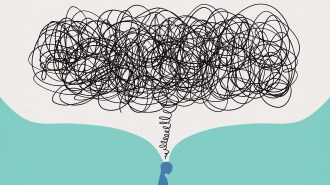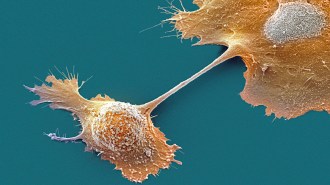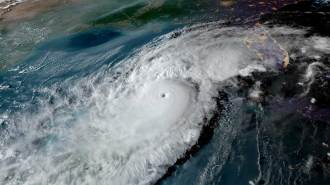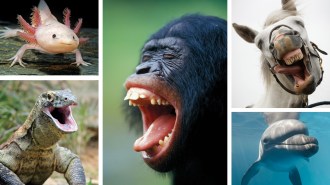Search Results for: seek
Skip to resultsCan’t find what you’re looking for? Visit our FAQ page.
5,118 results for: seek
-
 Health & Medicine
Health & MedicineOzempic and Wegovy ingredient may reverse signs of liver disease
The diabetes and weight loss drug semaglutide reversed liver scarring and inflammation. It’s among several drugs in the works for the condition MASH.
By Meghan Rosen -
 Psychology
PsychologyBreaking negative thought patterns could ward off anxiety, depression
Getting stuck in a negative loop is part of many mental health disorders. A new therapy focuses more on these thought patterns than the thoughts themselves.
By Sujata Gupta -
 Health & Medicine
Health & MedicineAn mRNA cancer vaccine may offer long-term protection
A vaccine kept patients free of pancreatic cancer for years, yet new reports say the NIH is advising against mentioning mRNA tech in grants.
By Meghan Rosen -
 Neuroscience
NeuroscienceBy studying the eyes, a researcher explores how the brain sorts information
Freek van Ede seeks to understand how the brain selects information to plan for the future. He’s finding clues in the tiny movements people make with their eyes.
-
 Humans
Humans100 years after the Scopes trial, science is still under attack
In 1925, John Scopes was indicted for teaching evolution. Science News looks at the forces that led to the trial and how expertise was the big loser.
-
 Materials Science
Materials ScienceA materials scientist seeks to extract lithium from untapped sources
Lithium is an essential ingredient for batteries in electric vehicles but getting enough will become a problem.
By Anna Gibbs -
 Health & Medicine
Health & MedicineTelehealth helps people get health care, but access may soon be in limbo
COVID-era telehealth laws made health care more accessible for rural patients, but telehealth might not be as easy to access next year.
By Sophie Hartley and Andrea Tamayo -
 Climate
ClimateClimate change has amped up hurricane wind speeds by 29 kph on average
Every single Atlantic hurricane in 2024 had wind speeds supercharged by warming seas. One even jumped two categories of intensity.
By Nikk Ogasa -
 Genetics
GeneticsWhat 23andMe’s bankruptcy means for your genetic data
As 23andMe prepares to be sold, Science News spoke with two experts about what’s at stake and whether consumers should delete their genetic data.
-
 Health & Medicine
Health & MedicineA shadowy market for weight-loss drugs has emerged online
People are buying semaglutide and tirzepatide, the key ingredients in Ozempic and Zepbound, from unconventional sources. Doctors have safety concerns.
By Meghan Rosen -
 Animals
AnimalsAnimals experience joy. Scientists want to measure it
Scientists have long focused on quantifying fear and other negative emotions in animals. Now they’re trying to measure positive feelings — and it’s a challenge.
By Amber Dance -
 Health & Medicine
Health & MedicineWhy are so many young people getting cancer?
Diagnoses for several cancers before age 50 have been increasing rapidly since the 1990s. Scientists don’t know why, but they have a few suspects.